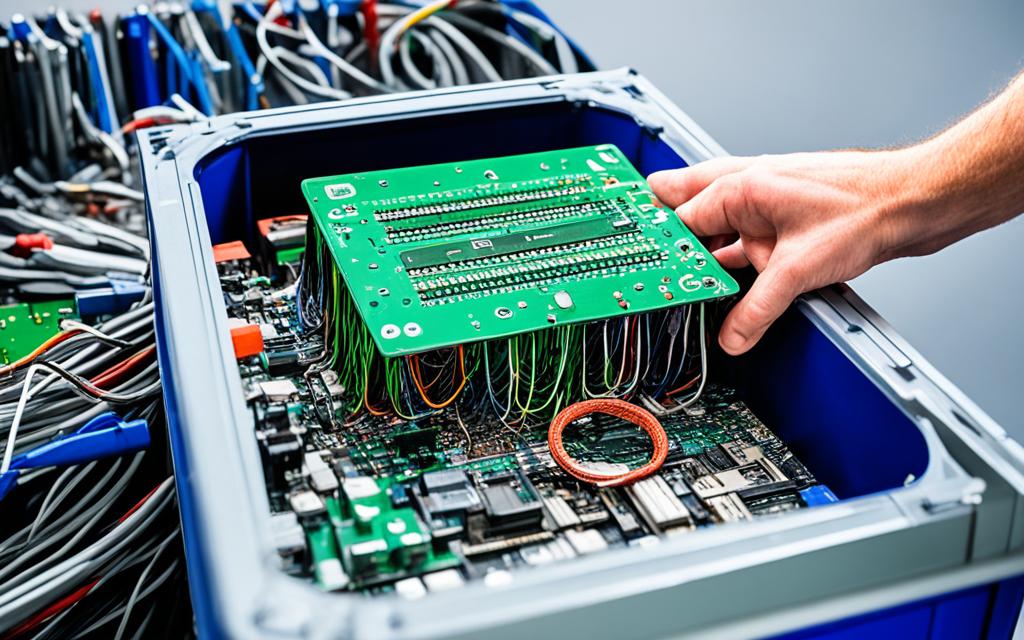Innovations in Secure Data Recycling
With the increasing reliance on data in today’s digital age, businesses are recognizing the need for secure data recycling and disposal methods. Traditional methods like physical destruction and degaussing are still widely used but can be time-consuming and costly. However, innovative solutions have emerged, such as software-based wiping tools that overwrite data multiple times and mobile shredding services that securely destroy paper documents on-site.
Additionally, cloud-based storage providers have implemented enhanced encryption measures and deletion protocols to ensure the complete eradication of customer information. The field of data disposal is constantly evolving, with trends like blockchain technology and artificial intelligence playing a role in enhancing security and transparency.
Disk Sanitization with Software-Based Wiping Tools
Disk sanitization is a crucial step in ensuring the complete erasure of sensitive data from storage devices. One innovative method of achieving this is through the use of software-based wiping tools, which employ advanced algorithms to overwrite data multiple times with meaningless information. By doing so, these tools make it virtually impossible to recover any original content, thus ensuring the privacy and security of the data.
Software-based wiping tools offer several advantages over traditional methods of data destruction. Firstly, they provide a more efficient and cost-effective solution, eliminating the need for physical destruction or degaussing equipment. Instead, these tools can securely erase data from a variety of storage media, including hard drives, solid-state drives, and flash drives.
“By overwriting data multiple times, software-based wiping tools render it irretrievable, providing peace of mind that no sensitive information can be recovered.”
Another benefit of software-based wiping tools is their versatility. These tools can be easily customized to meet specific data sanitization requirements, allowing organizations to comply with various regulatory standards.
However, it is important to note that software-based methods may not be suitable for all types of media. For example, certain types of magnetic media, such as older hard drives with high coercivity, may require physical destruction or degaussing for complete data erasure.
Implementing software-based wiping tools requires careful consideration and proper implementation to ensure the effectiveness of the data erasure process. Organizations should employ certified software tools and follow industry best practices to guarantee the thorough eradication of sensitive data.
Benefits of Disk Sanitization with Software-Based Wiping Tools:
- Efficient and cost-effective method of data destruction
- Ability to securely erase data from various storage media
- Customizability to meet specific regulatory requirements
- Enhanced privacy and security through multiple data overwrites
- Applicable for a wide range of data sanitization needs
While software-based wiping tools offer a reliable and efficient solution for disk sanitization, it is important to assess the suitability of these methods for specific data destruction needs. By understanding the capabilities and limitations of software-based wiping tools, organizations can implement appropriate data erasure practices and ensure the secure disposal of sensitive information.
Mobile Shredding Services for Secure Document Destruction
Mobile shredding services have gained traction as an innovative solution for secure document destruction. Specialized vehicles equipped with industrial-grade shredders visit business premises to securely destroy paper documents on-site. This eliminates the need to transport sensitive information to a separate facility, ensuring maximum security and preventing data breaches. Mobile shredding services offer convenience, efficiency, and peace of mind for businesses looking to securely dispose of sensitive documents.
The Benefits of Mobile Shredding Services
Mobile shredding services provide numerous benefits for businesses seeking secure document destruction:
- Convenience: With mobile shredding services, businesses don’t have to spend time and resources transporting documents to an off-site shredding facility. The shredding service comes to them, saving valuable time and effort.
- On-Site Shredding: By shredding documents on-site, businesses can witness the destruction process firsthand, ensuring complete security and peace of mind. This eliminates any concerns about potential mishandling or unauthorized access to sensitive information.
- Compliance with Data Protection Regulations: Mobile shredding services adhere to strict data protection regulations, such as the General Data Protection Regulation (GDPR) in the United Kingdom. This helps businesses comply with legal requirements and avoid costly penalties associated with data breaches.
- Environmentally Friendly: Mobile shredding services prioritize environmentally sustainable practices. After shredding, the paper waste is typically recycled, contributing to a greener and more sustainable approach to document disposal.
Case Study: Secure Document Destruction for ABC Financial Services
“We were looking for a secure and efficient way to dispose of our confidential client documents. Mobile shredding services provided the perfect solution. Their team arrived on-site with their top-of-the-line shredding equipment and took care of everything. We were able to witness the destruction of our sensitive documents, giving us complete peace of mind. We highly recommend mobile shredding services for any business in need of secure document destruction.”
– Jane Smith, Compliance Officer at ABC Financial Services
| Benefits of Mobile Shredding Services | Traditional Off-Site Shredding |
|---|---|
| Convenience and Time-Saving | Requires transportation and time spent preparing documents for off-site shredding |
| On-Site Shredding | Lack of visibility and control over the destruction process |
| Compliance with Data Protection Regulations | Potential risk of non-compliance with data protection laws |
| Environmentally Friendly | No guarantee of environmentally responsible disposal |
Cloud-Based Storage Providers and Enhanced Data Deletion Protocols
Cloud-based storage providers have made significant strides in ensuring the secure disposal of customer information through the implementation of enhanced encryption measures and comprehensive data deletion protocols. These advancements have bolstered the protection of sensitive data and reduced the risk of unauthorized access.
When it comes to data disposal, cloud-based storage providers are committed to rendering deleted files virtually unrecoverable. Advanced encryption techniques are utilized to overwrite the data, making it nearly impossible for anyone to retrieve or reconstruct the original information.
By offering secure and convenient cloud-based data destruction services, these providers eliminate the need for physical access to hardware, providing a more efficient solution for erasing sensitive information stored in the cloud. With just a few clicks, businesses and individuals can securely dispose of their data without compromising the integrity and privacy of their information.
Benefits of Cloud-Based Storage Providers for Secure Data Disposal:
- Convenience: Cloud-based storage providers offer a user-friendly interface that allows for seamless data deletion, eliminating the need for manual and time-consuming processes.
- Enhanced Security: With robust encryption measures in place, the risk of unauthorized access to deleted files is significantly reduced, ensuring the protection of sensitive information.
- Cost-Effective: Cloud-based data destruction services eliminate the need for investments in physical infrastructure and equipment for secure disposal, saving businesses both time and money.
- Scalability: Cloud-based storage providers cater to businesses of all sizes, offering scalable solutions that can accommodate their growing data disposal needs.
- Sustainable: By removing the reliance on physical hardware and adopting cloud-based solutions, businesses contribute to a more sustainable approach to data disposal, minimizing the environmental impact associated with traditional methods.
In conclusion, cloud-based storage providers have revolutionized the way data is securely disposed of by implementing enhanced encryption measures and comprehensive data deletion protocols. The convenience, enhanced security, cost-effectiveness, scalability, and sustainability offered by these providers make them an ideal choice for businesses and individuals looking to ensure the secure disposal of their sensitive information.
Innovations in Data Destruction Technologies
As technology evolves, the field of data destruction is constantly witnessing new innovations. Two notable advancements include the utilization of artificial intelligence (AI) algorithms and the exploration of blockchain technology.
Artificial Intelligence for Enhanced Security
Artificial intelligence is being harnessed to analyze patterns in data storage devices and identify potential security risks or vulnerabilities. By proactively detecting and addressing these issues, organizations can protect their valuable information assets from unauthorized access. AI-powered algorithms offer the ability to monitor data storage systems in real-time, ensuring that any potential threats are swiftly identified and mitigated.
Implementing AI in data destruction technologies allows for a more intelligent and adaptive approach to security. These algorithms can identify irregular or suspicious activities, such as unauthorized access attempts or anomalous data transfers, significantly reducing the risk of data breaches. By continuously learning and evolving, AI-powered solutions provide organizations with greater insights and control over their data protection strategies.
Blockchain Technology for Transparent and Tamper-Proof Record-Keeping
Blockchain technology holds immense potential in transforming the data destruction process. By leveraging a decentralized network, blockchain creates an immutable, transparent, and tamper-proof ledger that records every transaction related to data destruction. This ensures that the information regarding when and how data was destroyed remains secure and auditable.
With the use of blockchain technology, organizations can establish trust and transparency in the data destruction process. Each transaction is cryptographically secured and linked to previous transactions, creating an unalterable chain of custody. This enables stakeholders to verify the authenticity and integrity of data destruction activities, minimizing the risk of fraudulent or unauthorized practices.
Furthermore, blockchain provides a means for secure disposal of cryptographic keys, ensuring that data cannot be recovered even if the storage media falls into the wrong hands. This enhances data privacy and protection, aligning with the increasing regulatory requirements and the need for organizations to demonstrate compliance with data protection standards.
Overall, the integration of artificial intelligence and blockchain technology in data destruction processes represents significant advancements. These innovations offer more effective methods for eradicating sensitive data, while also providing enhanced security, transparency, and accountability in the data destruction process.
Innovations in Data Destruction Technologies
| Innovation | Key Features |
|---|---|
| Artificial Intelligence (AI) |
|
| Blockchain Technology |
|
Conclusion
The field of secure data recycling innovations constantly evolves to meet the growing demands of businesses for secure and sustainable data management. From disk sanitization with software-based wiping tools to mobile shredding services and cloud-based storage providers with enhanced encryption and deletion protocols, there are numerous innovative solutions available.
Advancements in artificial intelligence and blockchain technology are transforming the data destruction process, providing more intelligent systems and ensuring transparency and tamper-proof record-keeping. These technologies enable organizations to proactively safeguard their information assets and establish secure data disposal practices.
As technology continues to advance, the future of secure data recycling holds promise for more effective and environmentally friendly methods of data disposal. By embracing these innovations, businesses can ensure the protection of sensitive information, mitigate the risk of data breaches, and contribute to a sustainable and secure digital ecosystem.
FAQ
What is secure data recycling?
Secure data recycling refers to the process of disposing of electronic data in a secure and environmentally friendly manner to prevent unauthorized access and protect sensitive information.
What are some innovative methods of data destruction?
Innovative methods of data destruction include disk sanitization with software-based wiping tools, mobile shredding services for secure document destruction, and the use of cloud-based storage providers with enhanced data deletion protocols.
How does disk sanitization with software-based wiping tools work?
Disk sanitization with software-based wiping tools involves overwriting data multiple times with meaningless information, making it virtually impossible to recover any original content. This method ensures that data is irretrievable and privacy is safeguarded.
What are mobile shredding services?
Mobile shredding services are specialized services that securely destroy paper documents on-site. Equipped with industrial-grade shredders, these services visit business premises, eliminating the need to transport sensitive information to a separate facility.
How do cloud-based storage providers ensure the secure deletion of customer information?
Cloud-based storage providers implement enhanced encryption measures and comprehensive deletion protocols to ensure the complete eradication of customer information. Advanced encryption techniques render deleted files virtually unrecoverable, minimizing the risk of unauthorized access.
What role do artificial intelligence and blockchain technology play in data destruction?
Artificial intelligence algorithms analyze patterns in data storage devices to identify potential security risks or vulnerabilities, helping organizations proactively safeguard their information assets. Blockchain technology is being explored for transparent and tamper-proof record-keeping throughout the data destruction process.













